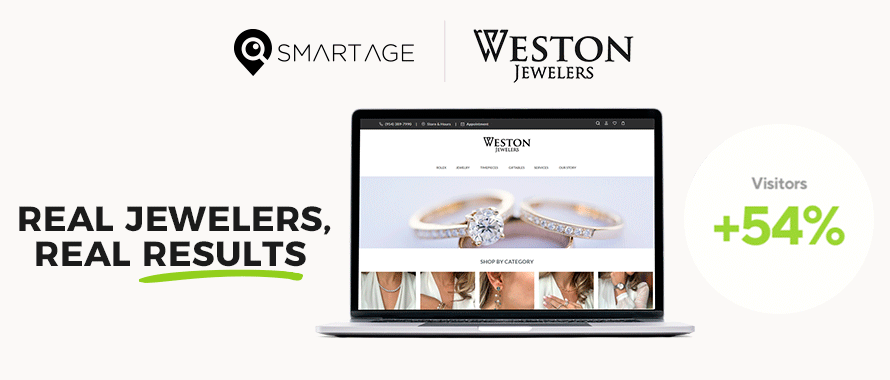Jewelry ECOMM Tech
The Two Faces of Online Search June 08, 2020 (0 comments)

When it comes to online search, let’s talk about the bottom line. How do people find you? If you cut through all the different types of digital marketing and all the jargon, probably the most valuable effort you can address is online search.
So, what is online search? Well, in a nutshell, it’s the ability to search online for and retrieve information. Think Google, who controls nearly 70% of searches online, although there are many others. For example, if a user searches for “Engagement Rings” a search engine like Google needs to process that users intent, based on their full search quarry, and provide relevant website listings (or map listings) in the form of SERP’s… that just means Search Engine Results Pages. The question we often hear is “How do I get on page one”? The short answer is by making your website easy to find. The long answer is much more involved.
Just because you have an expensive, great looking website doesn’t mean you’ll experience a flood of new visitors. Just like a high performance car, you need to maintain it and feed it gas to make it perform the way you want it to. There are two primary marketing efforts that do this SEM (Search Engine Marketing), which is often referred to as Paid Search, PPC or AdWords. The other is SEO (Search Engine Optimization). For today’s discussion I’m going to refer to them as Paid Search and SEO.
Paid Search and SEO are the two faces of online search, although Paid Search is the most commonly used of the two. Why? Because Paid Search is “easy” for just about anyone to set up and manage and SEO is much more technical. Although I would argue that Paid Search is very technical as well, but most users don’t know enough about the medium to realize what they’re doing wrong… although that’s a different article. In the end Paid Search and SEO are both part of and important for online search. Both these mediums are what help you show up in search listings with Paid Search being a “paid listing” and SEO contributing to an “organic listing”. On Google, paid ads can take up to the first four listings on a search results page followed by organic listings, with the bottom three listings also reserved for paid ads. Many of you are already doing Paid Search, the paid ads, either internally, through an agency or one of your vendors. However, how many of you are actively participating in SEO or the organic listings? The answer is much less and therein lies the opportunity.
Understand, a paid click or and organic click is the same user… the same searcher. So it doesn’t matter if they click on your paid listing or your organic listing. This is where paid and organic listings can complement each other and allow you to increase traffic to your site. For example, if a jeweler is spending $2,000 -$3,000+ per month on Paid Search and not doing SEO, which helps with organic listings, they may be missing a bigger opportunity. You see Paid Search has one obvious flaw… you are limited by the amount you spend per month. Each click costs you and once you deplete your budget, no more ads for you! However, organic search isn’t tied to any budget and the clicks cost you nothing. Now, there is a small catch. You have to be able to show up in organic search. There is a lot of competition in that space and that’s where SEO comes into play. However, the cost of doing ongoing SEO vs. Paid Search can be much less when you factor in the number of clicks you receive from each vs what you paid for them. That said, I’m not saying abandon your Paid Search efforts! Remember, I said they are the yin and yang of online search. That’s because they can serve two distinctive purposes. Paid Search allows you to bid on many different types of keywords, whereas SEO is about optimizing your website and typically focuses on your core business. You’re not going to rank organically for the same keywords in paid search. Instead, you are looking for the top 4-6 keyword searches you may want to rank high for. Part of what SEO does is help to develop content and optimize your site to let Google know that your site is relevant for the keyword searches you are focusing on. The question is, if you’re not doing both, why? It may force you to think more strategically in your digital efforts and where dollars should be allocated. That’s a good thing.
Bottom line is that Paid Search and SEO should work together to drive more traffic to your website. If you’re only doing one or the other, you’re missing out.


